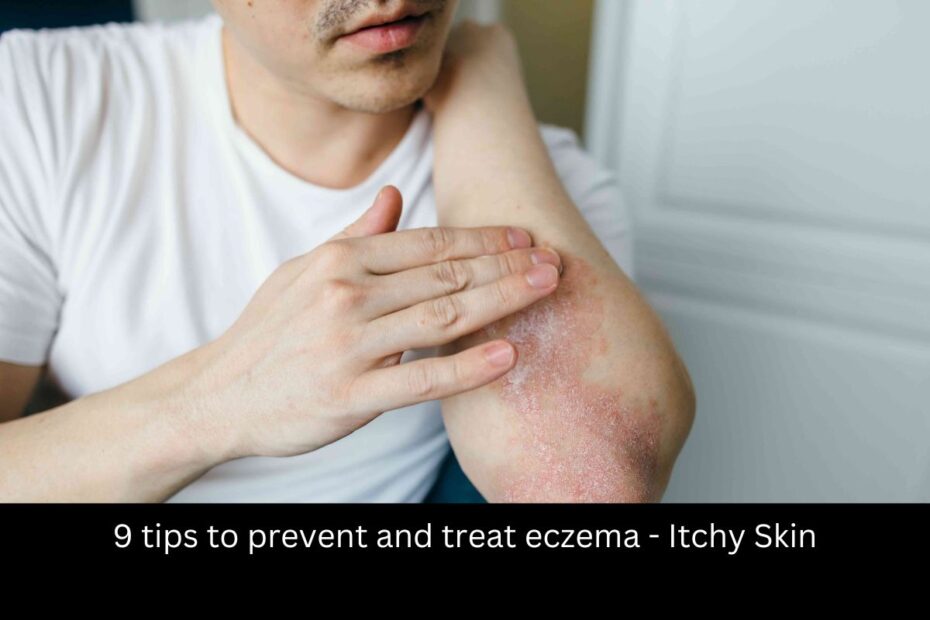9 tips to prevent and treat eczema – Itchy Skin :-Atopic dermatitis, often known as eczema, is a common skin ailment that causes the skin to become itchy and irritated. It is necessary to employ a combination of preventative measures and specific treatments in order to achieve effective management and therapy. The following are nine guidelines that are vital for preventing and treating eczema:
9 tips to prevent and treat eczema – Itchy Skin
1. Moisturize Regularly
For effective management of eczema, frequent moisturising is essential. Applying a thick moisturiser or emollient that does not include any fragrances numerous times per day, particularly after bathing, is recommended.
Because of this, the skin barrier is strengthened, which helps to reduce dryness and irritation. This also helps to seal in moisture. Choose cosmetics that have been developed specifically for skin that is sensitive.
2. Identify and Avoid Triggers
By gaining an understanding of and avoiding the triggers of eczema, flare-ups can be avoided. Specific textiles, such as wool, strong soaps and detergents, allergies, and temperatures that are extremely high or low are all examples of common triggers.
A journal should be kept in order to keep track of potential triggers and reduce exposure. In order to guarantee that new goods do not cause irritation to your skin, it is important to perform a patch test before using them.
3. Practice Gentle Skincare
To avoid irritation, use shampoos and cleansers that are gentle and do not contain any aroma. Products that contain dyes, scents, or harsh chemicals should be avoided at all costs. If you want to avoid stripping your skin of its natural oils, it is best to use lukewarm water rather than hot water when you are taking a bath or shower.
4. Implement Proper Bathing Techniques
Limit the length of your baths to around ten to fifteen minutes, and steer clear of soaking. You should use a gentle towel to pat your skin dry rather than rubbing it. In addition to preventing skin irritation, this moderate method enables the skin to maintain moisture.
Also see :-10 foods to Improve your Heart Health
5. Wear Soft, Breathable Fabrics
If you want to reduce the amount of friction and irritation, choose cotton clothing that fits loosely. The use of wool and synthetic textiles, which might make symptoms worse, should be avoided. Fabric softeners and dryer sheets should be avoided when washing clothes, and hypoallergenic detergents should be used instead.
6. Manage Stress Effectively
Stress can either bring on eczema or make it worse. Participate in activities that are known to reduce stress, such as yoga, meditation, or exercises that include deep breathing. In the event that stress is a severe problem, you should think about getting assistance from a mental health specialist.
7. Use Prescription Medications as Directed
If therapies available without a prescription are not sufficient, you should seek the advice of a healthcare expert to obtain prescription drugs. It is usual practice to apply topical corticosteroids in order to cut down on inflammation and itching.
It is possible that non-steroidal treatments, such as calcineurin inhibitors, will be suggested in the event that steroids are not appropriate.
8. Maintain a Healthy Lifestyle
Keeping yourself hydrated by drinking a lot of water is beneficial to the general health of your skin. In addition, your skin can get the benefits of a well-balanced diet that is abundant in omega-3 fatty acids, antioxidants, and vitamins.
It is possible to alleviate the symptoms of eczema by avoiding recognised allergens and following a healthy lifestyle strategy.
9. Consult a Dermatologist
When dealing with eczema that is severe or persistent, it is best to consult a dermatologist. Additionally, they are able to provide individualised treatment regimens and may suggest allergy testing in order to pinpoint particular allergens that are contributing to your existing disease.
